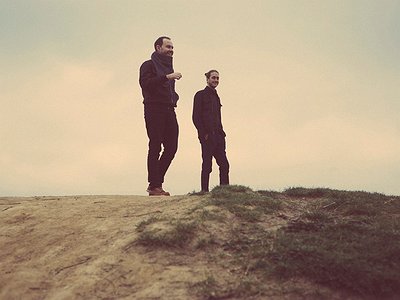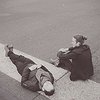Part 1
Name: Ben Lukas Boysen & Sebastian Plano
Nationality: North American/Argentinian
Occupation: Composers
Current Release: Everything by Erased Tapes
Recommendations: BEN:Mica Levi - Under The Skin / Danny Bensi & Saunder Jurriaans - Enemy and SEB: Elliot Goldenthal - Alien III /Various Artists - The Edukators
Website / Contact: If you enjoyed this interview with Ben Lukas Boysen & Sebastian Plano, their websites are benlukasboysen.com and www.sebastianplano.com
When did you start composing film/game music - and what or who were your early passions and influences? What drew you to music and/or sound?
BEN: Music was omnipresent in my family ever since I can remember. No other form of (not only) artistic expression was more suitable for what I wanted to express. As much of a cliché this might be, I always wrote music for (non-existent) films, pictures and situations and so my dream was always to write for actual films and games.
SEB: I was born into a family of musicians and they kept a cello in the closet for a while until I got my hands on it! My parents work in orchestras so I was sneaking into theatres and listening to their concerts when I was a little kid. One day, I remember asking my dad for a Vangelis cassette tape for my 12th birthday and that was the start of a new music world for me.
For most artists, originality is first preceded by a phase of learning and, often, emulating others. What was this like for you? How would you describe your own development as an artist and the transition towards your own voice? What is the relationship between copying, learning and your own creativity?
BEN: Understanding, and originally copying what my idols did and how they expressed themselves was the foundation for how I compose. Interpreting and translating this understanding matters the most to me. I always felt that other artists help you shape your skills and help you bring out what you have to say rather than being something or someone you want to copy. It’s where you take your impressions, influences and interpretations and also how your audience interprets your work that forms your voice.
SEB: You should never stop searching and most importantly, challenging yourself as well as your creative perspective. It’s about understanding the core of why you admire the artist and then moving on.
What were your main compositional challenges when starting out as a composer and how have they changed over time?
BEN: For me it was my lack of theoretical and practical musical knowledge. I was never good in both of these fields and need help sorting certain things out, still today. Thankfully the exchange with fellow musicians and friends showed me that it’s about joining forces rather than being great at everything.
SEB: Writing music started as a hobby for me when I was 9. It was amazing to have the possibility to print out parts and hand them to my mom who would play the viola, my dad and sister would play the violin and me the cello part, it was an instant gratification being able to make the piece come to life with such spontaneity.
Today, I am always finding challenges and do hope to always find them!
What, to you, are the main functions and goals of soundtracks and game music and how would you rate their importance for the gaming experience as a whole? How do you maintain a balance between, on the one hand, artistic integrity and sticking to your creative convictions and, on the other, meeting the expectations of the director?
BEN: Music in films and games has to work outside its domain. At the same time, it needs to support the story as without taking centre stage or distract from what you see/hear. This balance is tricky but crucial.
I trust that if a director asks for a collaboration, that he is willing to have a part of my own handwriting going into his work as well. This might sound like a basic thought but it’s not really self-evident. This establishes trust, freedom and mutual respect. Director and composer should ideally be equals - no precedence or egocentricity.
Once this is the case you can follow your interpretation of the director’s narrative much better and more freely. Nothing inspired will ever come from a forced or one-directional workflow.
SEB: A soundtrack can be of such importance for any audio-visual project, at times, bringing the whole work to life. I truly think this is the case with 'Everything'. When it comes to artistic integrity, my opinion is that you may have some room for compromise but one should strictly decide to do so only if it doesn't corrupt your creativity.
What was your first studio like? How and for what reasons has your set-up evolved over the years and what are currently some of the most important pieces of gear for you?
BEN: When I was 17 I had an MPC2000 and two speakers. I always aimed for a minimalistic setup because I was never an engineer or recording artist in the classical sense, which is why I wanted to have a well-selected but not overly-packed project studio. This is the case today but, I frequently exchange certain parts of gear instead of collecting them. One centre-piece of my studio would be a Lexicon 224X reverb. It has the tendency and talent to open up unheard rooms and spaces for me.
SEB: My studio was, for a long time, four walls surrounding a cello. It was until the time I decided to release my first album when I started to gear up myself. Currently my most important pieces of gear are my cello, my night-beloved Yamaha CP-80 and the ribbons!
How do you make use of technology? In terms of the feedback mechanism between technology and creativity, what do humans excel at, what do machines excel at?
BEN: Generally, I’d say the magic point is not where the human mind and technology excel each other but where they come together. It’s about balancing out each other’s flaws/talents. The empathetic qualities of a human being meets the mechanic precision of machines - truly wonderful.
SEB: I tend to never use the standard or "correct" way to do things, sometimes I get in trouble because of how large things can get, but this, at most, bring surprises and spontaneous ideas. For instance, the most beautiful creation comes from total chaos; the earth!
Production tools, from instruments to complex software environments, contribute to the compositional process. How does this manifest itself in your work? Can you describe the co-authorship between yourself and your tools?
BEN: The interesting moments where flaws or shortcomings are mutually erased - when a software, something that is normally quite uninspiring to me in its nature, becomes the solution or helping hand for what you cannot achieve alone. Being a team with your machines matters.
SEB: There is a predominant use of acoustic instruments in my works, often having just the pure acoustic sound and at times running effects on them. Creating electronic sounds out of recorded noises and creatively sampling myself is something I do very often.






